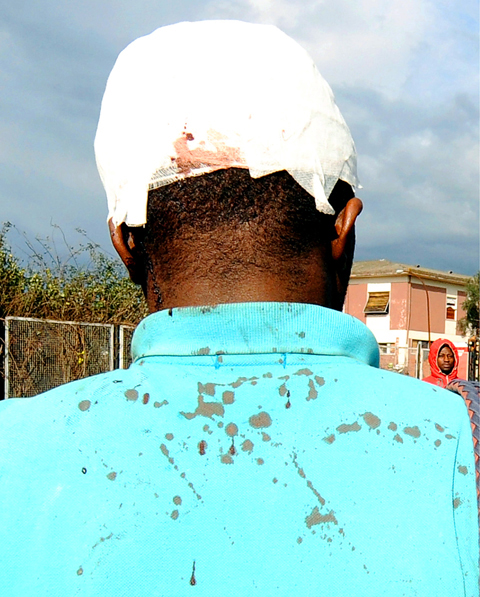Bloody clashes between African migrants and other residents in one of Italy’s poorest regions over the last few days have brought home a national dilemma: Many Italians don’t want to pick crops in the south or toil in the north’s factories, but resent the desperate foreigners who will work for a pittance.
Italian Prime Minister Silvio Berlusconi last year dismissed any notion of a “multiethnic Italy.” His conservative coalition, which includes the anti-immigrant Northern League party, has repeatedly cracked down on illegal immigration, sometimes drawing the ire of human rights advocates, UN officials and the Vatican.
With opinion surveys showing that many Italians blame immigrants for crime, tensions persist between citizens and foreigners — and sometimes erupt into violence, as they did these past days in Rosarno, a town in an underdeveloped southern agricultural region with chronic unemployment.

PHOTO: EPA
At least 38 people were wounded in the violence, which began on Thursday night when two migrants were shot with a pellet gun in an attack the migrants blamed on racism. Violence continued on Friday with clashes involving Africans, Rosarno residents and police. Among the more seriously wounded were three migrants beaten with metal rods.
By Saturday, the violence had largely subsided, except for a pellet-gun shooting that wounded a migrant on the outskirts of town, police said, and authorities began busing out some of the hundreds of frightened and angry migrants.
Others, lugging suitcases or tossing duffel bags over shoulders, headed for train stations or left in cars, said Laura Boldrini, an official from the UN High Commissioner for Refugees in Italy.
Perhaps half the 1,000 or so migrants — from Ghana, Nigeria and other African nations — chose to stay for now, many sleeping in tents or cardboard “rooms” in a dilapidated, abandoned former cheese factory on the outskirts of town.
Some have work permits, many are clandestine workers and others have refugee status, said Boldrini.
Just more than a year ago, two migrants were shot in Rosarno, one losing his spleen, Boldrini said. Then, the migrants reacted with a “peaceful march.”
This time “the immigrants reacted with violence, and this in turn triggered a spiral of violence,” the UN official said.
Although unemployment runs some 20 percent in the south — and at least double that among youth — few locals are willing to work so hard for so little: The kiwi, mandarin oranges and other citrus fruits are harvested by the migrants.

Eleven people, including a former minister, were arrested in Serbia on Friday over a train station disaster in which 16 people died. The concrete canopy of the newly renovated station in the northern city of Novi Sad collapsed on Nov. 1, 2024 in a disaster widely blamed on corruption and poor oversight. It sparked a wave of student-led protests and led to the resignation of then-Serbian prime minister Milos Vucevic and the fall of his government. The public prosecutor’s office in Novi Sad opened an investigation into the accident and deaths. In February, the public prosecutor’s office for organized crime opened another probe into

RISING RACISM: A Japanese group called on China to assure safety in the country, while the Chinese embassy in Tokyo urged action against a ‘surge in xenophobia’ A Japanese woman living in China was attacked and injured by a man in a subway station in Suzhou, China, Japanese media said, hours after two Chinese men were seriously injured in violence in Tokyo. The attacks on Thursday raised concern about xenophobic sentiment in China and Japan that have been blamed for assaults in both countries. It was the third attack involving Japanese living in China since last year. In the two previous cases in China, Chinese authorities have insisted they were isolated incidents. Japanese broadcaster NHK did not identify the woman injured in Suzhou by name, but, citing the Japanese

YELLOW SHIRTS: Many protesters were associated with pro-royalist groups that had previously supported the ouster of Paetongtarn’s father, Thaksin, in 2006 Protesters rallied on Saturday in the Thai capital to demand the resignation of court-suspended Thai Prime Minister Paetongtarn Shinawatra and in support of the armed forces following a violent border dispute with Cambodia that killed more than three dozen people and displaced more than 260,000. Gathered at Bangkok’s Victory Monument despite soaring temperatures, many sang patriotic songs and listened to speeches denouncing Paetongtarn and her father, former Thai prime minister Thaksin Shinawatra, and voiced their backing of the country’s army, which has always retained substantial power in the Southeast Asian country. Police said there were about 2,000 protesters by mid-afternoon, although

MOGAMI-CLASS FRIGATES: The deal is a ‘big step toward elevating national security cooperation with Australia, which is our special strategic partner,’ a Japanese official said Australia is to upgrade its navy with 11 Mogami-class frigates built by Japan’s Mitsubishi Heavy Industries, Australian Minister for Defence Richard Marles said yesterday. Billed as Japan’s biggest defense export deal since World War II, Australia is to pay US$6 billion over the next 10 years to acquire the fleet of stealth frigates. Australia is in the midst of a major military restructure, bolstering its navy with long-range firepower in an effort to deter China. It is striving to expand its fleet of major warships from 11 to 26 over the next decade. “This is clearly the biggest defense-industry agreement that has ever